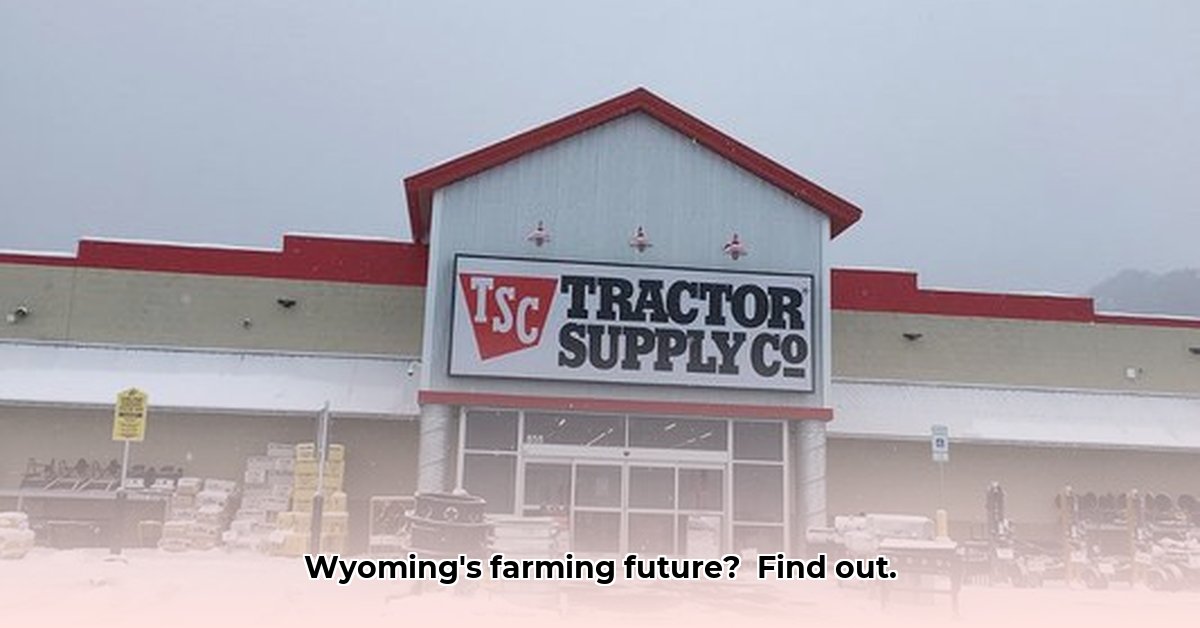
Imagine Afton, Wyoming: a landscape painted in hues of sagebrush and weathered barns, a testament to generations of resilient farmers. This small town, nestled amidst the vastness of the American West, faces the modern challenge of balancing agricultural productivity with environmental sustainability. At the heart of Afton’s agricultural community sits a familiar presence: Tractor Supply. But does this big-box retailer truly contribute to sustainable practices, or is it merely a convenient supplier of conventional farming inputs? This investigation explores Tractor Supply's role in Afton, highlighting both its potential and its limitations in supporting a more environmentally conscious future for Wyoming agriculture. For example, see a similar analysis of a Tractor Supply store in Union, MO: Tractor Supply Analysis.
A Closer Look at Accessibility and Product Selection
Tractor Supply's Afton location offers undeniable convenience for local farmers. Its wide selection of products, readily available, includes items plausibly related to sustainable farming practices. Drip irrigation systems, designed to conserve vital water resources, are stocked alongside organic fertilizers, promoting soil health without harsh chemical inputs. This accessibility is a significant asset for farmers, reducing travel time and effort. However, convenience alone doesn't guarantee a shift towards sustainable methods. A key question remains unanswered: Does the easy access to these potentially sustainable products translate into their actual adoption by Afton farmers? The need for rigorous data analysis becomes paramount here — anecdotal evidence alone isn't sufficient to confirm or deny Tractor Supply's influence on sustainable agriculture.
The Sustainability Puzzle: Data Gaps and Unanswered Questions
While Tractor Supply offers a range of products potentially useful for sustainable agriculture, a significant data gap clouds the complete picture of its overall contribution. Concrete data regarding their internal sustainability initiatives remains scarce. Do they actively promote organic farming through educational programs or in-store materials? What efforts, if any, are they making to reduce their environmental footprint, considering aspects like sustainable packaging, transportation efficiencies, and energy conservation within the Afton store itself? Without this crucial data, it is difficult to assess their precise impact on the local environment. It's an incomplete puzzle, hindering a comprehensive evaluation of their role in fostering sustainable agricultural practices.
The Afton Context: Local Conditions and Farming Practices
Successfully implementing sustainable agriculture in Afton demands an understanding of its unique environmental characteristics. The town's soil composition, water availability, and climate profoundly influence viable farming methods. The products offered by Tractor Supply must align with these realities. For example, water-efficient irrigation systems become critical in arid climates, while drought-resistant seed varieties could be key to the long-term health of the land. Does Tractor Supply provide farmers with the necessary information and guidance to effectively utilize these critical products? This question highlights the need to consider the local context in any holistic analysis of their impact.
The Path Forward: Research and Collaboration
The lack of readily accessible data doesn't signal failure, but rather points to the need for enhanced research and improved transparency. To gain a more complete understanding, several investigative steps are essential:
- Detailed Sales Data: A detailed analysis of sales figures, specifically for products associated with sustainable farming practices, would provide a concrete measure of farmer demand and adoption rates.
- Farmer Surveys and Interviews: Gathering firsthand accounts from farmers regarding their experiences and perceptions of Tractor Supply's contribution to their sustainability goals offers crucial insights.
- Environmental Impact Assessment: Thoroughly assessing the store's environmental footprint—energy consumption, waste management, and supply chain emissions—would provide valuable context for evaluating its overall environmental impact.
- Sustainability Practices Assessment: Reviewing Tractor Supply's internal sustainability programs and policies is vital to fully understand their commitments and actions.
Actionable Intelligence: Collaborative Steps Towards a Sustainable Future
To effectively enhance Tractor Supply's role in promoting sustainable agriculture in Afton, a collaborative approach is crucial. Key stakeholders must work together toward a shared goal. The following steps would pave the way for meaningful progress:
- Data-Driven Transparency: Tractor Supply should prioritize transparently reporting relevant environmental data for its Afton location, publicly sharing figures on energy use, waste generation, and sustainable product sourcing.
- Targeted Product Expansion: Expanding the selection of sustainable products—organic seeds, bio-fertilizers, water-efficient irrigation systems—is necessary. Direct collaboration with farmers to gather local feedback will enhance product offerings.
- Educational Partnerships: By partnering with the University of Wyoming Extension or similar organizations, Tractor Supply can empower farmers with educational resources and workshops on water conservation, soil health, and sustainable farming practices.
- Community Engagement: Actively engaging with the Afton community, supporting local sustainability initiatives, and sponsoring relevant events will strengthen Tractor Supply's positive impact.
The potential for fostering sustainable agriculture in Afton is substantial. By working collaboratively, we can gain a clearer understanding of Tractor Supply's contribution and work together to create a more sustainable agricultural future for Wyoming. This is a journey that requires ongoing investigation and commitment from all stakeholders.